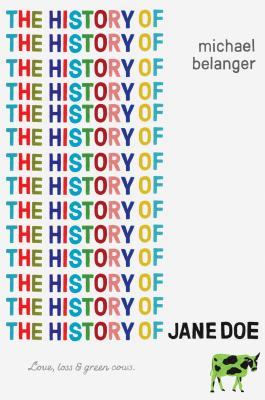Local author Michael Belanger will present his debut YA novel, The History of Jane Doe, at Bank Square Books in Mystic on Saturday, August 25, from 1:00–3:00 p.m. This event is free and open to the public; copies of the book will be available for purchase/signing. Location: 53 W. Main St.
***
Today, Michael Belanger graces us with his virtual presence.
Michael is the debut author of The History of Jane Doe (Dial Books), a highly acclaimed YA novel published in June. A high school history teacher by day, he is a member of the Westport Writers’ Workshop and faculty advisor to Greenwitch, a high school literary magazine that has published talented young writers—including Truman Capote—for over a hundred years. Michael makes his home in Connecticut.

Praise for The History of Jane Doe:
“[An] impressive debut…Suffused with quirky humor and equal parts life-affirming and heartbreaking, John Green fans will gobble this one up.”— Kirkus, starred review
“Readers looking for a moving, realistic portrayal of depression will appreciate this exceptional debut.”—Publishers Weekly
“A powerful debut with a story for fans of John Green and Jennifer Niven… guaranteed to tug at your heartstrings.”— BuzzFeed
“Mixing humor with heartache, this is an unmissable coming-of-age story from an exciting new voice in YA.”—BookBub
From the publisher:
A poignant, deeply funny coming-of-age story about first love, first loss, and the power of history to give life meaning.
History buff Ray knows everything about the peculiar legends and lore of his rural Connecticut hometown. Burgerville’s past is riddled with green cow sightings and human groundhogs, but the most interesting thing about the present is the new girl–we’ll call her Jane Doe.
Inscrutable, cool, and above all mysterious, Jane seems as determined to hide her past as Ray is to uncover it. As fascination turns to friendship and then to something more, Ray is certain he knows Jane’s darkest, most painful secrets and Jane herself–from past to present. But when the unthinkable happens, Ray is forced to acknowledge that perhaps history can only tell us so much.
Mixing humor with heartache, this is an unmissable coming-of-age story from an exciting new voice in YA.

Now, Michael Belanger reveals his backstory …
John Valeri: The History of Jane Doe is your debut novel. What is the title’s thematic significance – and how does “Jane” symbolize both uniqueness and universality at once?
Michael Belanger: The title encapsulates Ray’s attempt to find meaning in his year with Jane. As a historian, Ray is used to looking to the past for answers. By telling Jane’s history, Ray thinks he can make sense of what happened, and more importantly, find an answer to that nagging question of why things happened the way they did.
The anonymity of the name “Jane Doe” appealed to me from the beginning as a way to tell Jane’s story while also remaining sensitive to Jane’s past. In the book, Jane is an individual. She paints her nails all different colors. She loves folk music. She’s into conspiracy theories. But in a broader sense, her story is all too familiar. I wanted the reader to understand that Jane Doe could be anyone: your best friend, your significant other, the person who cut you off in traffic. Mental illness and depression are universal, though how they’re experienced defy definition.
JV: Your protagonist, Ray, is a history buff living in a fictional Connecticut town that is steeped in legend and lore. How did your own interests inform his character – and what commentary did you hope to offer on the idea that the past can be used as a predictor of the present, or not?
MB: I couldn’t have written the book without being passionate about history myself. I’ve always seen historians as quasi-superheroes, minus the underwear and cape—well, at least the kind of underwear you wear over the clothes. Society often looks to historians as having some sort of preternatural ability to predict the future. Of course, all they’re doing is studying trends and patterns, looking to understand how and why things happened the way they did. And in doing so, a certain sense of inevitability shades whatever event they’re studying. History is made up of people, so logic says that we can apply this same approach to a person.
Paradoxically, an individual can often be a whole lot more complicated than a society. Trends and patterns fall apart when you’re looking to explain a person’s actions and motivations. As Ray eventually realizes, sometimes the past can only tell us so much. Even the best historians often can’t see what’s coming.
JV: At its heart, Ray’s is a coming-of-age story. What are the hallmarks of this type of narrative – and how did you endeavor to capture a relatable teen experience that balances its familiarity with a sense of freshness?
MB: I think we’re all coming of age our entire lives. We’re always in a state of arrival. Unless of course that’s just me and I’m perpetually immature. There’s something so universal about firsts—first kiss, first love, first time you experience profound loss. But the interesting thing is that a lot of these life milestones will always feel like firsts. Every time you fall in love it’s different. That may be part of the reason why so many adults are drawn to young adult literature. Reading about high school is an escape into a feeling: there’s so much hope, so much uncertainty, so many horrible clothing choices. It’s irresistible.
JV: By day, you are a high school teacher. In what ways does this help you to stay in touch with the essence of adolescence? Also, how do you use fiction as a lens to explore the complex realities of growing up?
MB: Teaching high school has given me a front row seat for all of the challenges today’s teenagers face. Sure, some of the issues are different than when I was in high school, and the phones are a whole lot fancier, but the struggles are universal. Writing fiction has allowed me to explore these struggles and process my own experiences in high school from a safe distance. Just like a historian, distance can help you see something in a new way, and that’s definitely been the case for me and how I understand the teenage experience. I’ve seen countless students face very real world, adult problems, yet they haven’t had the life experience to help them find a solution. In some ways that’s tragic, but in another sense, it gives them these rose-colored glasses through which to see the world. Adults could benefit from wearing those glasses once in a while too.
JV: In your opinion, what is the role of a bookstore within its community – and how can attending an author event enhance the reader/writer/bookseller relationship?
MB: Bookstores connect people with ideas and experiences, the kind that require your imagination. All throughout my life, books have been my greatest teachers, guides that have offered me a new way to see the world, a better understanding of myself, and of course, the ability to pretend I’m a wizard (thank you, Harry Potter). What could be more special than introducing people to these new experiences? Sort of like a travel agent perpetually booking stress-free trips to places as different as Narnia and Burgerville.
It’s been such a thrill to connect with readers outside the world of social media. Instagram and Twitter are great for posting pictures of my cats, but some of my best experiences with Jane Doe have occurred in bookstores surrounded by fans. And yes, I used the word “fan” deliberately as a way to boost my self-esteem. It worked.
JV: Leave us with a teaser: What comes next/what are you working on now?
MB: Right now, I’m in the middle of another young adult novel that does for punk music what The History of Jane Doe does for history. I’ll leave it at that!
***
With thanks to Michael Belanger for his generosity of time and thought.
Don’t forget: The author will appear at Mystic’s Bank Square Books next Saturday, August 25, at 1:00 p.m.